World News
1-Iran Issues Dire Warning to Israel and Defies Trump on Nukes: “We’re Ready to Strike Deep Inside”
Iranian President Masoud Pezeshkian declares military readiness for war with Israel and rejects Donald Trump’s claim that Iran’s nuclear program is finished

Tensions in the Middle East just took a sharp and dangerous turn.
In a defiant and fiery address, Iranian President Masoud Pezeshkian has warned that Iran is prepared for full-scale war with Israel if provoked, signaling one of the most direct threats in recent memory. In a report carried by Al Jazeera, Pezeshkian declared that Iran’s armed forces are ready to strike “deep inside Israel” in response to any military escalation.

“We are fully prepared for any new Israeli military move,” said Pezeshkian. “Our armed forces are ready to strike deep inside Israel again.”
The sharp rhetoric comes amid growing instability in the region and renewed concerns over Iran’s nuclear ambitions. Pezeshkian’s statement isn’t just military posturing—it’s a public message that Iran sees confrontation with Israel as imminent and potentially unavoidable.
Not Hopeful About Ceasefire
Pezeshkian expressed skepticism about the potential for a ceasefire, stating bluntly:
“We are not optimistic. That is why we have prepared ourselves for any possible scenario.”
He accused Israel of initiating harm, while asserting that Iran had retaliated, describing the situation as a balance of retribution. “Israel has harmed us, and we have also harmed it,” he said, referring to ongoing clandestine operations, cyberattacks, and proxy conflicts in Syria, Lebanon, and beyond.
This escalation comes in the wake of months of tension along the Israeli-Iranian axis, including attacks on Iranian military advisers in Syria and drone strikes targeting Israeli-linked cargo ships. Pezeshkian’s warning implies that Iran is ready to move from covert operations to direct military engagement if necessary.
Table of Contents
Nuclear Program Far From Over, Says Iran
Perhaps even more startling was Pezeshkian’s direct rejection of Donald Trump’s recent remarks that Iran’s nuclear program had been “dismantled.” Pezeshkian scoffed at the former U.S. President’s assertion, stating that Iran’s nuclear knowledge is “not in the facilities—it’s in the minds of our scientists.”
“Trump says that Iran should not have a nuclear weapon, and we accept this,” Pezeshkian said. “Because we reject nuclear weapons—this is our political, religious, humanitarian, and strategic position.”

Still, the Iranian leader left no doubt that the country’s nuclear ambitions are alive and deeply embedded within its national identity. The message was clear: Iran will not bow to Western pressure, sanctions, or threats.
Diplomacy—But Not at Any Cost
While Iran appears open to dialogue, Pezeshkian clarified that any future negotiations would need to be conducted under a “win-win” framework, without threats or ultimatums.
“We believe in diplomacy, but we will not accept threats and dictates,” he said.
This is a subtle jab at both the U.S. maximum pressure policy and Israel’s shadow war tactics. Pezeshkian is drawing a red line: Iran may sit at the negotiation table, but only on equal footing.
This positioning is a calculated move. With growing international pressure, economic sanctions, and a restless public, the Iranian regime is signaling that military defiance and diplomatic sovereignty remain its top priorities.
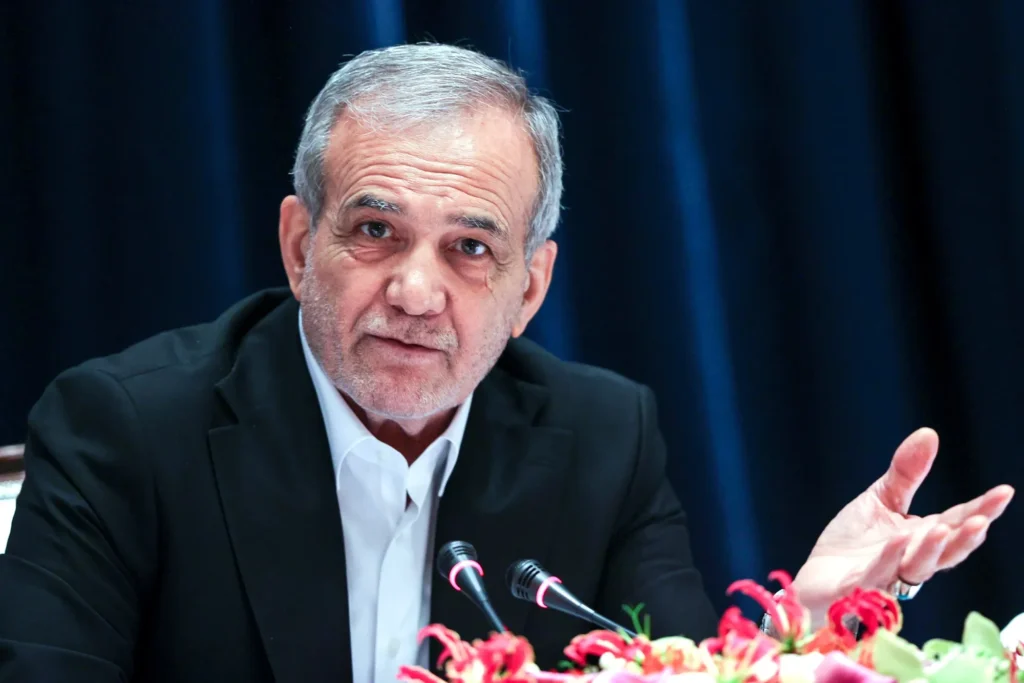
Global Reactions and the Road Ahead
International reaction has been swift and measured. The United Nations called for restraint, while European Union officials expressed concern over Iran’s aggressive posturing. Meanwhile, Israel has yet to issue a direct response, though Israeli defense sources told local media that they are “monitoring the situation very closely.”
Security analysts believe the remarks are part of Iran’s psychological warfare strategy—reminding Israel and the West that any strike will be met with overwhelming response. But others worry that such threats can quickly spiral into unintended conflict, especially with Iran-backed groups like Hezbollah already on edge in the region.
Why It Matters Now
This moment could mark a significant pivot in U.S.-Iran-Israel relations. With Trump potentially preparing for another presidential run and Congress divided on Middle East policy, Pezeshkian’s public statement is as much aimed at Washington as it is at Jerusalem.
It also highlights the deep fragility of the so-called “nuclear freeze” narrative, suggesting Iran’s program is more resilient and decentralized than ever before.
For more Update http://www.dailyglobaldiary.com
World News
New Zealand pays Samoa millions after naval ship sinks… human error blamed for reef disaster
HMNZS Manawanui crash sparks environmental crisis, online controversy, and the country’s first naval loss since World War II
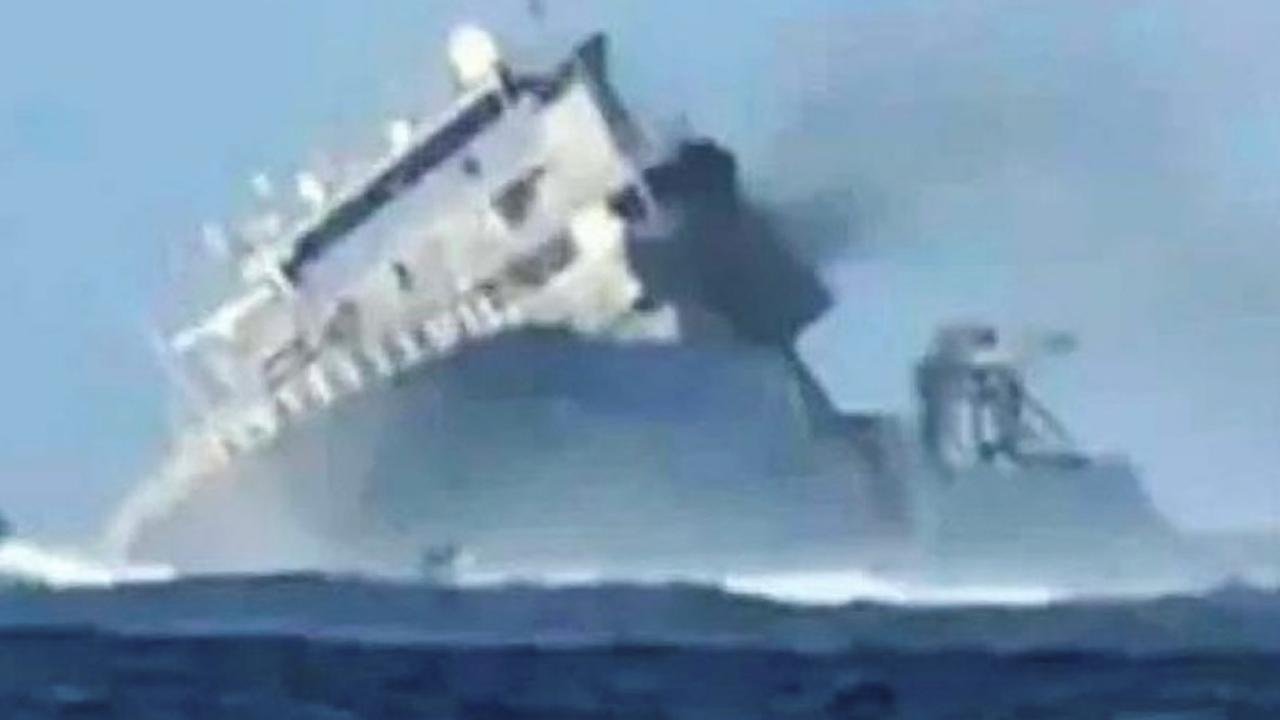
A year after one of its naval vessels ran aground and sank in Samoan waters, the New Zealand Government has paid 10 million Samoan Tala (NZD 6 million; £2.6 million) in compensation to Samoa.
The ship, HMNZS Manawanui, crashed into a reef off the coast of Upolu, sparking a fire before sinking beneath the waves. The incident, which occurred during a seabed survey in October 2024, was the first time New Zealand lost a naval ship at sea since World War II.
Oil slicks and dead sea turtles
The vessel began leaking oil after it went down, with slicks spreading onto nearby beaches and alarming reports of sea turtles washing ashore dead. Samoan authorities voiced concern about the environmental fallout, while local fishing communities reported disruptions to their livelihoods.
Foreign Minister Winston Peters confirmed the payment to Samoa, stating it was made “at Samoa’s request” and reflected the “serious impact on communities and the environment.”
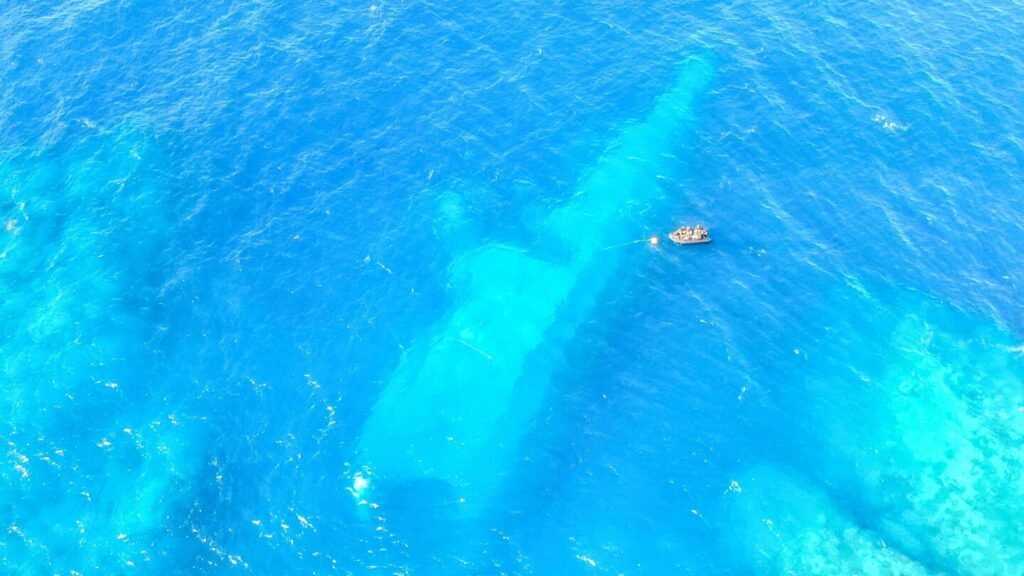
“We recognise the impact the sinking has had on local communities and acknowledge the disruption it caused,” Peters said. “Minimising environmental damage and supporting Samoa in its response remain our top priorities.”
Human error at the core
A formal inquiry into the disaster revealed a chain of human errors, most notably the crew’s failure to disengage the ship’s autopilot. Investigators said this lapse led directly to the grounding.
Despite speculation about mechanical failure, the New Zealand Defence Force confirmed human oversight was the root cause. Disciplinary proceedings are expected, though officials have yet to announce outcomes.
The online storm
As details of the crash surfaced, the ship’s female captain became the target of sexist trolling on social media. Some users wrongly claimed her gender was to blame.
The backlash drew condemnation from New Zealand’s then-Defence Minister, who dismissed the critics as “armchair admirals,” stressing that systemic failings, not gender, caused the crash.
The clean-up operation
Following the sinking, New Zealand dispatched naval teams to remove diesel fuel, lubricants, and other pollutants from the wreck. Salvage divers also cleared debris to limit long-term damage to Samoan reefs.
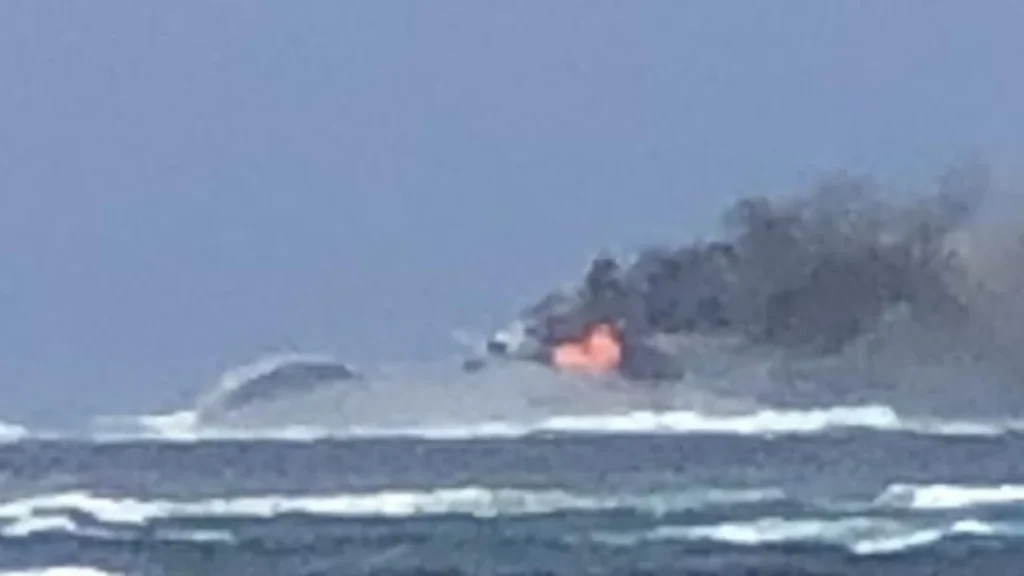
Still, HMNZS Manawanui remains lodged on the reef. Discussions continue between Wellington and Apia about its eventual removal or whether it should remain in place as an artificial reef.
What’s next?
The payment marks a rare intergovernmental settlement over a naval accident. While Samoa has welcomed the move, conservation groups remain cautious. Marine biologists warn the true scale of environmental damage may take years to assess.
For New Zealand, the episode is a sobering reminder of operational lapses and their consequences. For Samoa, it is both a financial settlement and a test of resilience in protecting its fragile marine ecosystems.
For more Update http://www.dailyglobaldiary.com
World News
Chinese Jets Intercept Canadian Air Force Plane Tracking North Korean Ships: What We Learned from the Dramatic Encounter
As tensions rise in the East China Sea, Canadian forces push forward with Operation NEON, tracking North Korean vessels amid Chinese military interference.
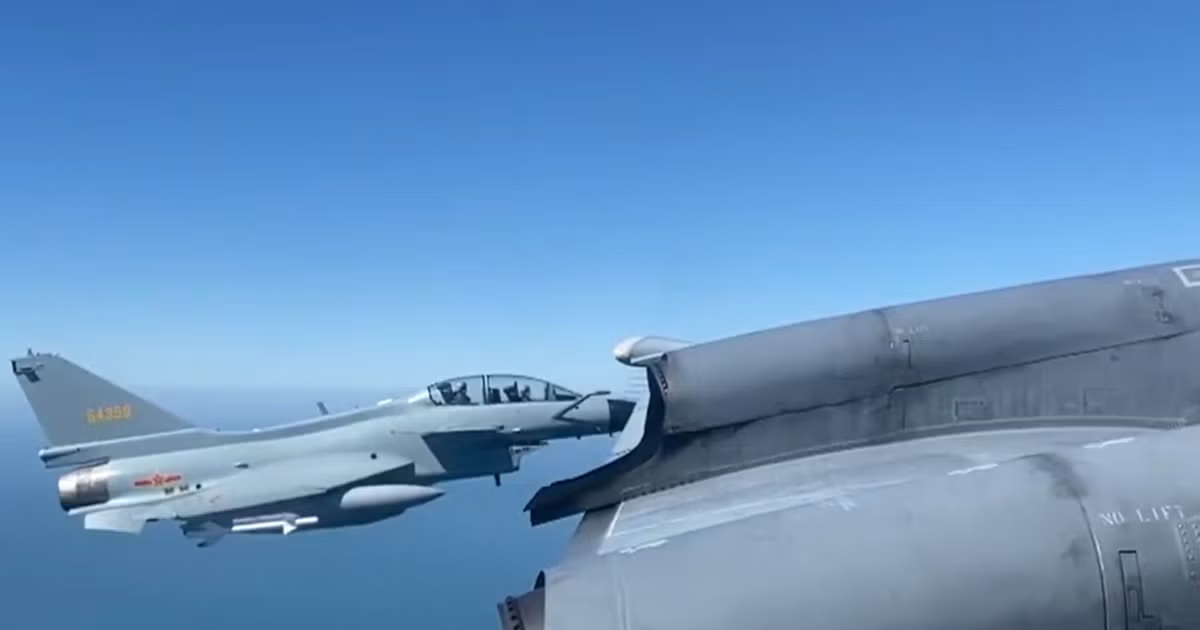
Operation NEON continues to play a critical role in monitoring and enforcing United Nations sanctions on North Korea. In the latest development, a Canadian Air Force CP-140 Aurora maritime patrol aircraft, on a mission over the East China Sea, encountered dramatic interference by Chinese fighter jets.
The mission, intended to track North Korean vessels violating international sanctions, became a tense standoff when Chinese jets intercepted the Canadian plane on multiple occasions. This high-stakes operation, which started on October 6, 2025, underscores the growing geopolitical tensions in the region, particularly involving China, North Korea, and Canada’s role in global security.
The Mission: Surveillance of Illicit Trade
The CP-140 Aurora is primarily used to track enemy submarines, but this time it’s being deployed to track North Korean ships involved in illicit trade. Under Operation NEON, the Aurora is gathering intelligence, taking photographs, and documenting suspicious vessels in the East China Sea, particularly those linked to North Korea’s nuclear weapons programs.
“We’ve certainly seen vessels that appear suspicious,” says the captain, who has been deployed for this mission. However, his identity has been withheld for security reasons. This mission serves as part of a broader, coordinated multinational effort to pressure North Korea into abandoning its weapons of mass destruction programs.
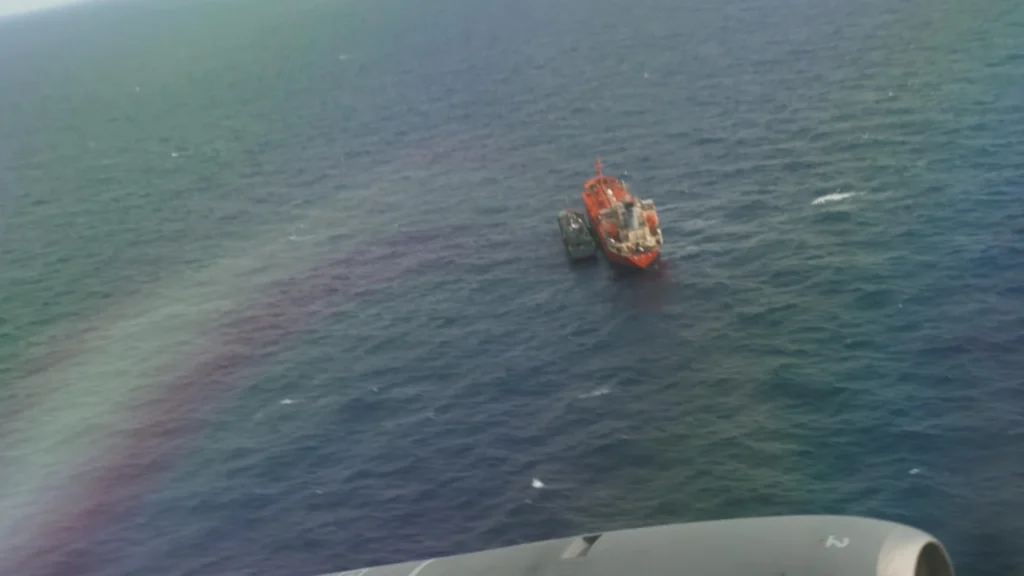
Chinese Intercepts and Growing Tensions
Operating in international airspace over international waters, the Canadian plane found itself increasingly within China’s radar. The Chinese military, unhappy with the presence of a foreign aircraft near its border, dispatched fighter jets to intercept the Aurora multiple times.
One of the intercepts saw the Chinese jet getting dangerously close to the Aurora, flying within 200 feet of the Canadian aircraft. Despite the hostile actions, the Aurora’s captain remained composed, calmly telling the Chinese pilot, “I’m a Canadian aircraft operating in international airspace, carrying out the duties of all nations.”
Such encounters are not entirely unexpected but have added an extra layer of risk to the mission. Brigadier General Jeff Davis, who commands the Canadian operation, stressed, “As long as things remain professional and safe, this mission continues unabated.”
China’s Role in North Korea’s Survival
The geopolitical backdrop to this encounter reveals China’s significant role in North Korea’s economy. Since 2006, China has been North Korea’s economic lifeline, especially after international sanctions were imposed following Pyongyang’s first nuclear test. While Russia has recently also provided support, China’s involvement remains pivotal in sustaining North Korea’s economy.
This relationship is critical as North Korea continues to develop nuclear weapons, with estimates suggesting it possesses around 50 nuclear warheads. The Kim regime has made clear its intentions to force the world into accepting it as a nuclear power, as it nears the development of long-range missiles capable of delivering nuclear payloads to the U.S. mainland.
The High-Risk Operation
Despite the clear danger posed by these intercepts, the Canadian Air Force crew is determined to continue with Operation NEON. The crew’s primary mission is to collect crucial intelligence for the United Nations’ Enforcement Coordination Cell, which is tasked with ensuring sanctions compliance.
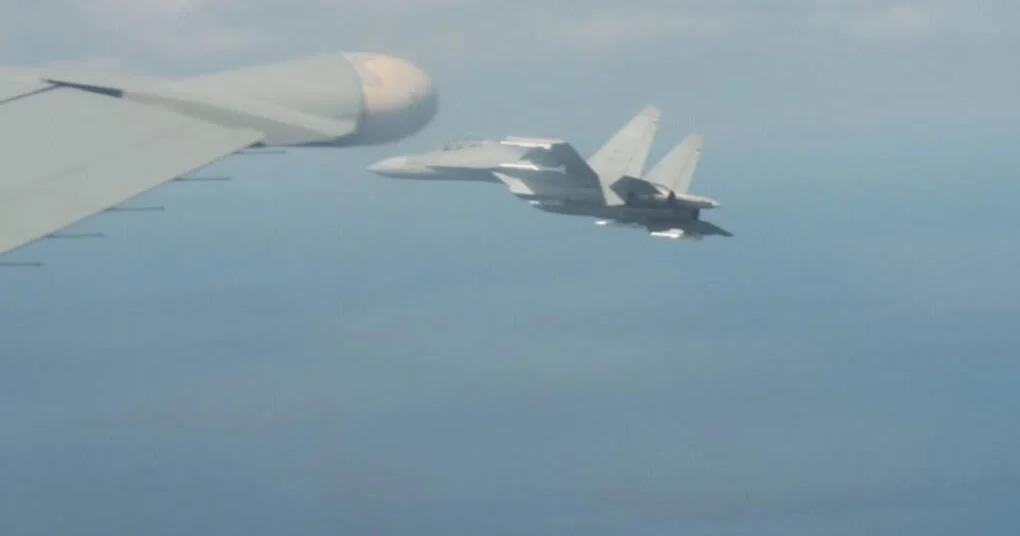
“This adds stress to the mission,” admits the Canadian pilot. “Sometimes they try to maneuver closer, but we do everything we can to keep the aircraft safe.” The intercepts are not just tense but also reflect the rising militarization of the East China Sea as China seeks to assert its dominance in the region.
The Bigger Picture: U.S. and Global Involvement
As the situation continues to evolve, **U.S. President Donald Trump has expressed a willingness to meet with Kim Jong Un again, despite the lack of tangible results from their past summits. Trump, who has met with Kim three times, continues to push for diplomatic engagement, albeit under terms that Kim finds unacceptable. This dynamic is part of a broader international challenge, as nations like China, Russia, and the U.S. navigate the complexities of dealing with North Korea’s nuclear ambitions.
A Mission Completed Despite Challenges
After nine hours of intense intelligence gathering, the Aurora returned to base, completing its mission under incredibly difficult circumstances. The operation highlighted the importance of international cooperation and intelligence sharing in the face of rising global tensions.
For more Update http://www.dailyglobaldiary.com
World News
Donald Trump warns of ‘complete obliteration’ if Hamas refuses Gaza exit — “We will find out soon…”
As Hamas signals partial acceptance of Donald Trump’s 20-point Gaza peace plan, the former US President warns that any refusal to step down from power will lead to “complete obliteration.”

US President Donald Trump has issued a chilling warning to Hamas, saying that if the militant group refuses to step down from power in Gaza, it would face “complete obliteration.” His statement comes as peace talks — part of Trump’s ambitious 20-point Gaza peace plan — are set to begin in Egypt this week.
The warning arrived shortly after Hamas announced on October 3 that it had agreed to release all Israeli hostages, both alive and dead, under the framework of Trump’s proposed plan. The development was viewed by many as the first real breakthrough since the escalation of the Israel–Hamas conflict in late 2023.
ALSO READ : Brendan Carr to face Senate grilling after “free speech firestorm” over Jimmy Kimmel controversy — Ted Cruz calls remarks “dangerous as hell”
Trump’s 20-point peace plan — A new ‘Deal of the Century’?
According to Trump’s proposal, Gaza would be redeveloped with international funding, and Palestinians who wished to remain in the territory would be allowed to stay. The plan also offers amnesty to Hamas fighters, provided they surrender their weapons and dissolve their military structure.
The territory would be temporarily governed by a Palestinian-led committee, overseen by a newly formed Board of Peace chaired personally by Trump. Other global figures, including Tony Blair — the former UK Prime Minister — are also expected to serve on the board.
However, what caught global attention was Hamas’ failure to explicitly agree to withdraw from power in Gaza. When asked by CNN anchor Jake Tapper what would happen if Hamas remained in control, Trump’s reply was blunt and unfiltered:
“Complete obliteration!”
Lindsey Graham raises doubts over Hamas intentions
The reaction from Washington was swift. Lindsey Graham, the Republican Senator from South Carolina, expressed skepticism on X (formerly Twitter), suggesting that Hamas’ response was “a classic ‘Yes, but…’” — a diplomatic half-step rather than true cooperation.
“No disarmament, keeping Gaza under Palestinian control, and tying hostage release to negotiations… this is essentially a rejection,” Graham wrote. “It’s not a real acceptance of President Trump’s take-it-or-leave-it offer.”

When Tapper asked Trump if Graham’s assessment was wrong, Trump replied, “We will find out. Only time will tell!!!” — a line that has since gone viral among both critics and supporters.
Israel ‘on board,’ says Trump
Trump also revealed that Benjamin Netanyahu, the Israeli Prime Minister, had signaled support for halting Israel’s bombing campaign in Gaza, provided Hamas genuinely commits to peace. “We will know soon whether they are serious,” Trump told reporters, without elaborating on whether he had spoken directly to Netanyahu or mediated through back channels.
The former president, who is widely expected to run again in the 2028 US elections, has portrayed his Middle East peace plan as a defining part of his global legacy. Supporters see him as a pragmatic dealmaker capable of ending decades of bloodshed, while critics accuse him of oversimplifying a deeply complex conflict.
The global stakes — peace or provocation?
For millions across the Middle East, Trump’s words carry weight far beyond American politics. His past involvement in the Abraham Accords reshaped Arab-Israeli diplomacy, normalizing relations between Israel and nations such as United Arab Emirates and Bahrain.
But experts warn that Gaza’s situation is far more fragile. “Unlike previous accords, the issue here is internal — about who governs Gaza, not just who recognizes Israel,” said Dr. Aaron David Miller, a former US State Department negotiator, in an interview with CNN. “If Trump’s approach is perceived as forcing Hamas’ hand without legitimate Palestinian representation, it could reignite violence.”
Egypt and the international role
The next round of peace negotiations is expected to take place in Cairo, under Egyptian mediation. Egyptian President Abdel Fattah el-Sisi has reportedly invited senior officials from both Hamas and the Palestinian Authority to participate. Meanwhile, European diplomats — including representatives from France, Germany, and the United Kingdom — are expected to join as observers.
The United Nations has welcomed Trump’s involvement but urged caution. “Any peace plan must ensure the protection of civilians and allow for humanitarian access,” said António Guterres, UN Secretary-General.
Trump’s personal stake in the peace process
For Trump, who has been simultaneously battling multiple legal cases in the United States, the Gaza peace initiative marks a return to global stagecraft — a realm where he often thrives. Political analysts believe the move could strengthen his international profile and rally his conservative base.
Yet, critics argue that his approach risks alienating allies who view his language as “provocative.” One senior European Union diplomat told Reuters, “Every time Trump uses the term ‘obliteration,’ it sends shockwaves through the region. It’s not typical diplomatic language — it’s a warning, not a negotiation.”
What comes next
As the world awaits Hamas’ full response to the peace plan, there’s cautious optimism mixed with deep uncertainty. If Hamas truly agrees to demilitarize and accept temporary governance under the proposed Board of Peace, it could mark the most significant diplomatic breakthrough in years.
But if not — the message from Donald Trump is crystal clear.
“Complete obliteration.
In his latest bold declaration, Donald Trump has re-entered the Middle East peace spotlight with a direct warning to Hamas. While his 20-point Gaza plan offers a pathway to redevelopment and reconciliation, the future of Gaza’s governance — and the fragile peace that depends on it — remains uncertain.
-

 Entertainment1 week ago
Entertainment1 week agoDolly Parton delays Las Vegas concerts by nine months citing health challenges but promises unforgettable return
-

 Entertainment1 week ago
Entertainment1 week agoZoey Deutch engaged to comedian Jimmy Tatro after 4 years of dating with romantic beach proposal
-

 Politics1 week ago
Politics1 week agoBarack Obama blasts Trump over Tylenol autism claim calling it ‘violence against truth’ but that’s not all he said…
-

 Sports4 days ago
Sports4 days agoShohei Ohtani finally pitches in MLB playoffs after 2,746 days… will this be the moment that defines Dodgers vs Phillies?
-

 Technology News1 week ago
Technology News1 week agoBitchat downloads skyrocket in Madagascar as protests erupt over water and power cuts… Jack Dorsey’s app becomes a lifeline
-

 Entertainment6 days ago
Entertainment6 days agoSurvivor Season 49 episode 2 shocker Kele tribe loses again and fans stunned by who went home
-

 Entertainment4 days ago
Entertainment4 days agoCharlie Hunnam reveals chilling transformation into serial killer Ed Gein for Ryan Murphy’s Monster… “I didn’t want to glamorize it”
-

 Sports5 days ago
Sports5 days ago‘Silent killer’ Cam Schlittler stuns Red Sox as Yankees rookie makes history with 12 strikeouts








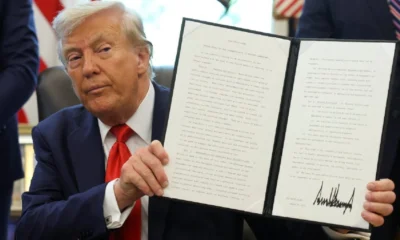




















superph11
August 16, 2025 at 6:35 AM
Roulette’s randomness is fascinating – the math behind it is truly elegant! Seeing platforms like superph11 app cater to local preferences with options like GCash is smart. It’s about more than just games; it’s community & convenience!